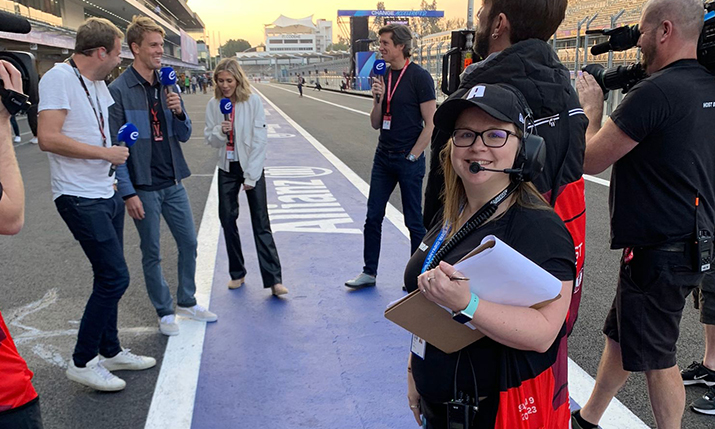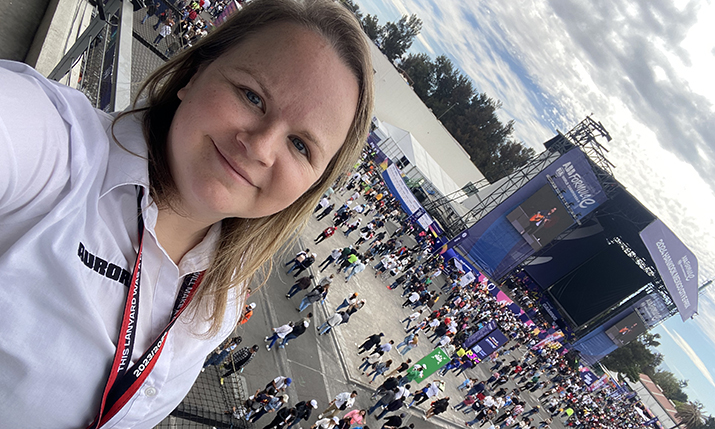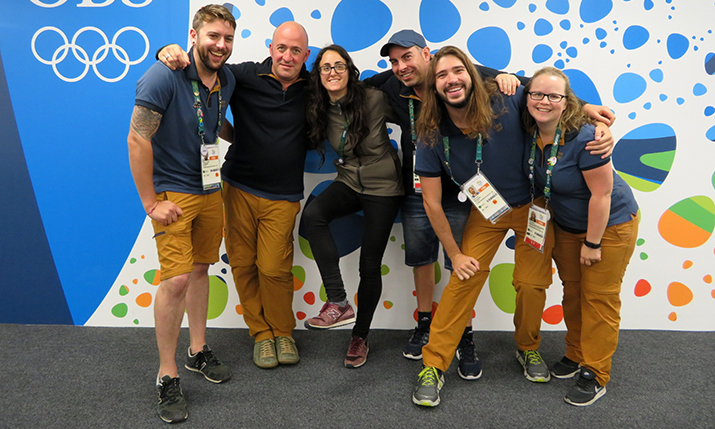Food for thought: Following the career of Aurora Media Worldwide producer Kate Andrews from factual and entertainment to extreme sports

Aurora Media Worldwide’s Kate Andrews field producing on Formula E
“I always knew I wanted to work in the entertainment industry, but when I was younger, I envisaged a career path in movies or drama as that is what I loved watching the most,” says Kate Andrews, producer at Aurora Media Worldwide. “The choice to move to sport came later for me and in some ways, was somewhat accidental. It was only when the opportunity of working on the Rio 2016 Olympics made me realise how much I enjoyed watching sport that I eventually went into a career working in sports broadcasting.
“Sport can really bring people together and a sporting event can mean a lot to a large number of people. Getting to be a small part of a creation of that kind is incredibly special.
On what draws her to a career in live sports broadcasting, Andrews says: “It is mostly the travel and the adrenaline rush you get from a live production. You get to visit places you definitely would never consider going to and you get to meet people from completely different backgrounds. Every production we do has its own challenges and I thrive on working under pressure. There is nothing quite like the intensity of a live event!”
She adds: “Although probably the hardest thing about sports broadcasting, it is also the most enjoyable; the travel and the spontaneity,” she continues. “There are not many jobs where you get to see the world whilst working in one of the most adrenaline inducing environments. The team you work with become your travelling family, and there is such a colossal feeling of achievement when you manage to successfully deliver an event as a team, especially when you’ve been up against some immense challenges. There really is no feeling like it.”

Aurora Media Worldwide producer Kate Andrews on site for the Formula E Mexico E-Prix in 2024
Vanguard of extreme sports
Andrews loves working at Aurora. She explains why: “Aurora has always been the vanguard of remote sports broadcasting. Watching the creation of new sporting programmes such as Extreme E or E1 whilst being produced from thousands of miles away, still to this day, is technically mind boggling to me, and I’m lucky enough to see both sides of the creation of such an amazing feat.
“On Formula E as the field producer, part of my role is that I am the eyes and the ears on the ground for the director back in London. I look after the scheduling of the RF cameras to make sure he has eyes where he needs to and that he has a voice on the ground.
“There is still room for the industry to do more when it comes to women and diversity in the workforce. I am lucky to have come across a lot of incredible people in my career and, at Aurora, I am privileged to be surrounded by so many talented women that champion the women around them”
For Extreme E I work from London looking after the satellite feeds for EVS and the edit, making sure that we are receiving what we need to see from the team on site, who are usually in the most extreme locations, to build a programme from this end. It’s unbelievable what the technical team can pull off.
“I am lucky to be a part of the team that produces the Super League Triathlon Arena Games, now re-branded as SuperTri E, a concept that was first created during lockdown where they combine both virtual and real live triathlon racing using Zwift technology. Its concept was to keep traditional athletes racing during the pandemic, and Aurora was honoured to be involved for the last two years. It has been amazing to see the series evolve and adapt. Blending the two worlds together, virtual and reality, seamlessly, whilst keeping the viewers in mind the whole time,” she comments.
The hardest part about her job at Aurora has been the sheer scale of sports productions. Andrews explains: “The part I first found hardest about my first role at Aurora was just finding my feet on such large scale events; knowing who is responsible for what and where.
“I remember thinking that I wish I could skip to three months in so that everything is not ‘new’ and I know what I’m doing. Now I find walking into a new event is almost second nature. You just have to jump in and go for it, it’s amazing what skills and experience you can pick up on the way.
“The hours are long and you have to throw everything you have at it, but I think that’s where the travel is beneficial, I find when I’m on site you’re all in, making the time you get to explore these amazing places even more appreciated. This year I have already worked on four events, in four different locations, in four weeks. Each role more different than the last. You have to stay flexible and adapt to what is needed of you.”
Finding a balance so she is not overstretched at work is a skill Andrews has had to work on, she admits. “It’s a very busy industry and I personally really struggle with saying no; I find that I might be working on multiple projects simultaneously but there’s always something else you could be working on. It’s a struggle to enforce boundaries and often find it difficult to have that important work life balance as I’m abroad or out of the office on events for more than half of the year.”
Yet she adds: “Although working in sports broadcasting is a front row seat to the action and can be very rewarding, most if not all events take place at the weekend, and if working remotely the hours can be incredibly anti-social. It’s a demanding environment, not for the faint-hearted
“For me personally, the most challenging thing I suffer with the imposter syndrome, I still have days where I think, why am I here, I’m not doing a good enough job or there aren’t enough hours in the day to accomplish everything.”

Kate Andrews with her OBS team at the Rio Olympics in 2016
Theatre or TV?
When Andrews started out, she was not sure what role she actually wanted. She says: “Even though I wanted to work in entertainment, I knew I was never made to be in front of the camera or centre stage, and not just due to my lack of any acting, singing or dancing talent!
“I enjoyed being behind the scenes, behind the camera or behind the lighting desk, but I still wasn’t sure exactly what role I wanted to do. At one point I believed I would be taking a route into the theatre scene following a time when I produced one of my school musicals and worked as a volunteer in the front of house at my local theatre. At school I applied for a number of different courses at different universities – all entertainment related either in theatre, TV or film – and eventually fell in love with York St John University where I studied Film and Television Production. It was a brilliant course that gave me a little taster of every aspect of film and TV, plus I got to live in one of the most beautiful cities in England.”
In her first year outside of university, Andrews found herself applying for jobs across all aspects of television. She got the interview for her first job in TV while she was at a different interview at a post production house; her dad was talking to a neighbour’s new girlfriend over the garden fence. She happened to work in TV production, and he discovered her company had a runner’s role that they were interviewing for that day.
“One quick phone call had me with less than an hour to find somewhere to print a copy of my CV and to get to the other side of London,” Andrews reminisces. “I made it just in time and after an enjoyable interview where I think the advantage was that I hadn’t had time to overthink it, I came out with a job offer and started three days later.”
The job was at Shine Television as an office runner. Andrews says: “They were a great company for training runners up to work on productions. They had a rule where you had to do your four months’ probation period as an office runner before you could apply to move onto a production. On the day of my four month review, they put me straight onto MasterChef: The Professionals as a technical runner, which was more of a camera assistant role, with a side of tea-making.
“It was a complete baptism of fire – long days and extremely hard work – but a great entry into the production world,” she remembers. “I am so grateful for that first job; it was an eye-opener into how much you have to dedicate yourself to each production you work on otherwise you might not make it.”
Food for thought
On her way to sports broadcasting, Andrews spent a lot of time working on food programmes. She says: “Although I had a few detours with one movie and a few shiny floor entertainment programmes, I predominately worked in food television, working on some of the biggest food shows, Britain’s Best Dish, Iron Chef and The Great British Menu. Although enjoyable, it wasn’t a huge passion of mine. Whilst I enjoyed cooking, I’d never really been an avid food-show viewer.
“I then got the job as food producer on Sunday Brunch, a role I had for over two years, and probably one of my favourite jobs I ever had. I met some of my best friends on this programme and the job itself was lots of fun. I always said it was going to have to be a really amazing job offer that would eventually take me away from it.
“A few years prior to this, I had interviewed for a position on the London 2012 Olympics and had been told there wasn’t anything suited for me and they would ‘keep my CV on file’ which I assumed was a brush off,” Andrews reminisces. “However a few years later I randomly got a phone call for an interview for Rio 2016 as a technical coordinating assistant for the Olympic News Channel. At the time I felt like although it was a bit of a step down from producer level, I was ready for a change from the food world. Plus this is the Olympics – the world’s foremost sporting event – and I would get to travel alongside it. It was a no-brainer in the end.
“When I got back from the Olympics, it was obvious to me, I wanted to take a chance and move genres to the sport. I started to work my way up back up the ladder (whilst taking the odd short term food producer job, or Sunday Brunch cover to help pay the bills).”
As a freelancer in sports broadcasting Andrews found it challenging at first to get her foot in the door, despite having just worked in Rio. However, a friend sent her a Facebook ad for an AP on the Turkmenistan Asian Games with Progress Productions. Things finally kicked off.
She says: “This role gave me the opportunity to work in a country that doesn’t often open its doors to foreigners, it was a real once in a lifetime experience. As an AP I was working at the wrestling venue alongside a producer, doing the sports presentation for the in-bowl ticket buyers and ceremonies. During production, unfortunately my producer had to rush home for a family emergency and the team at Progress Productions trusted me enough to take over the venue by myself. It still amazes me the faith they had in me at the time.”
New opportunities
On why the move into sports broadcasting from factual, Andrews states: “Firstly, my family are big motorsport fans; when I think of a typical Sundays in the Andrews Household, I think of watching Formula 1 after a big family roast, so Formula E appealed to me straight away.
“However I actually debated about taking the job at Aurora because it was a staff position and I wasn’t sure if I was ready to give up freelancing after only a few years into my sports broadcasting career. The swaying factor was that it would offer me one of the things I loved the most, the ability to travel.”
It has not always been plain sailing for Andrews who has experienced prejudice at work. She explains: “You never really get over some things that people say to you when you are first starting out in your career. The sports production industry is predominately male and some men think that as a woman, especially a young woman, you’re an easy target. Even now, working in some of the less forward-thinking countries, I have had men refuse to take instruction from a woman.
“I do find that people assume I work in production management rather than editorial because I’m female,” she continues. “Although I have seen some incredible female producers working their way into the sporting world, it is still a very male-dominated industry. My current company, Aurora, are doing so much to combat this, but there is still room for the industry to do more when it comes to women and diversity in the workforce. I am lucky to have come across a lot of incredible people in my career and, at Aurora, I am privileged to be surrounded by so many talented women that champion the women around them.”
Yet to other women looking to move into a role in sports broadcasting like her own, Andrews says: “Never to give up. There are opportunities out there, you just need to keep working hard and keep looking for them.
“There are a lot of great programmes and organisations that want to help support women in sport, you just need to find them. Also, you never know what jobs will lead to new prospects. That smaller contract role could lead to meeting some new great people and they can give you new opportunities. Never underestimate networking!”

